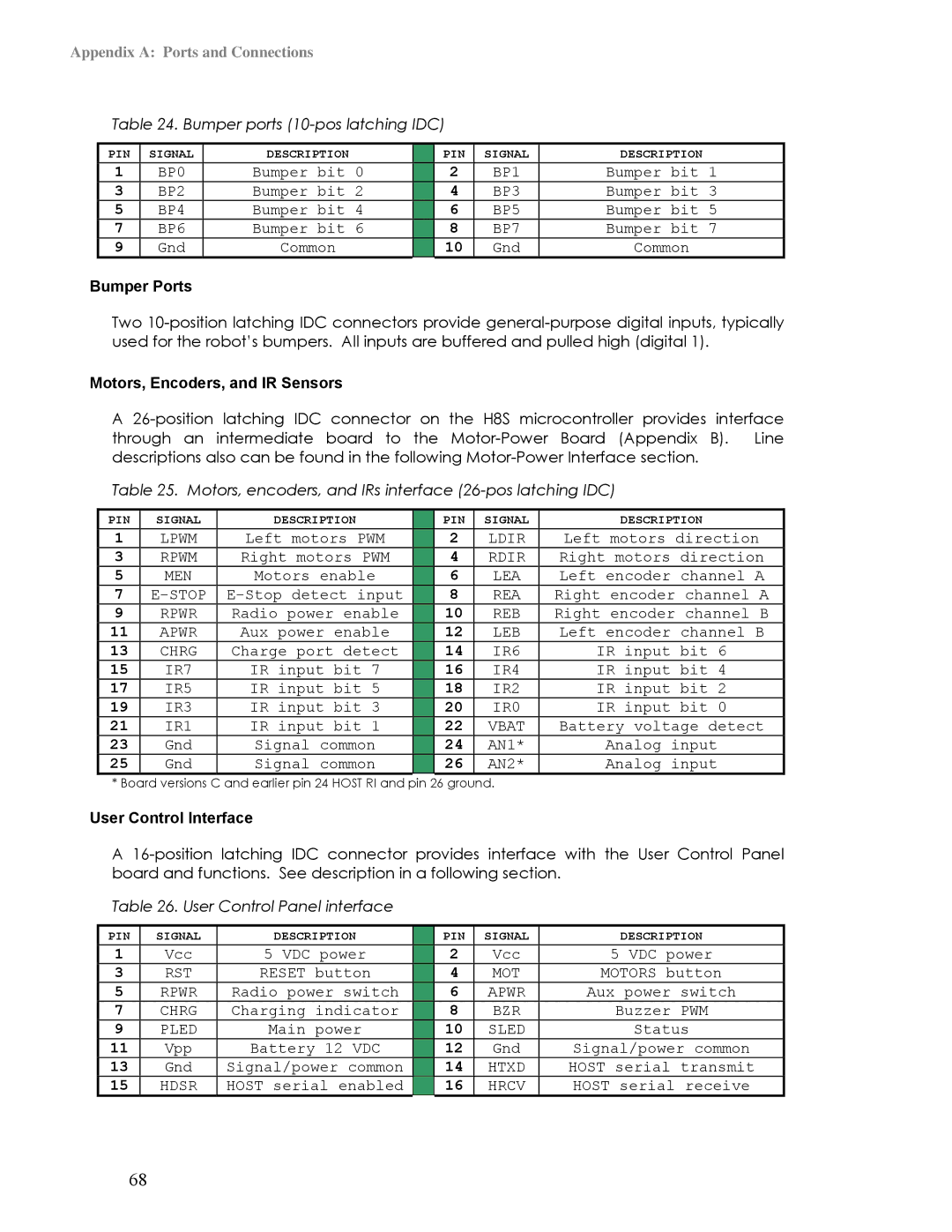Pioneer H8-Series Operations Manual
Page
Important Safety Instructions
Table of Contents
Operating the Aria Demonstration Client
Appendix C
Basic Components all shipments
Introduction
Robot Package
Optional Components and Attachments partial list
Support Website
User-Supplied Components / System Requirements
Additional Resources
Newsgroups
Support
Support@activmedia.com
What Is Pioneer?
Pioneer Reference Platform
Plus MOTOR-POWER Board
Hitachi H8S-BASED Microcontroller
Client Software
Http//robots.activmedia.com
Supporting Software
Pioneer Legacy
Pioneer 1 and AT
Pioneer 2 and PeopleBot
ActivMedia Robotics
Modes of Operation
Server Mode
Maintenance and Standalone Modes
Joydrive and Self Test Modes
Specifications & Controls
Physical Characteristics
Main Components
Motor Stop Button
User Control Panel
P3-DX User Control Panel
Body, Nose, and Accessory Panels
Sonar Arrays with Gain Adjustment
Batteries and Power
Motors, Wheels, and Position Encoders
Battery Indicators and Low Voltage Conditions
Recharging
DOCKING/CHARGING System
Manual Operation Robot Power OFF
Manual Operation Robot Power and Systems on
Radio Controls and Accessories
Client-server connection options
Onboard PC
Computer Control Panel
Operating the Onboard PC
PC Networking
UPS and Genpowerd
Safety Aros Watchdogs
Quick Start
Preparative Assembly
Install Aria
Starting UP Client and Server
Install Batteries
Client-Server Communications
Drive Self-Test
Demo Startup Options
Ipthru
Successful Connection
Operating the Aria Demonstration Client
Proper Connections
Disconnecting
Quickstart Troubleshooting
OFF
SRIsim
Joydrive Mode
Joydrive and Self-Tests
Engaging SELF-TESTS
ActivMedia Robotics Operating System
CLIENT-SERVER Communication Packet Protocols
Packet Errors
Packet Checksum
Server Information Packets
Multiply by DistConvFactor‡
Client Commands
Before Client Connection
P2OS
CLIENT-SERVER Connection
Keeping the Beat-PULSE
Autoconfiguration SYNC2
Opening the Servers-OPEN
Closing the Connection-CLOSE
Motion Commands
Rotation
ActivMedia Robots in Motion
Platform Dependent and Independent Variables
PID Controls
Internal coordinate system
Sonar
Enable/Disabling Sonar
Position Integration
Polling Sequence and Rate
Stalls and Emergencies
11-15 Reserved
Accessory Commands and Packets
Packet Processing
Changing Baud Rates and Autobauding
CONFIGpac and Config Command
Serial Port Communications
Gripper packets
HOST-to-AUX Serial Transfers
Encoder Packets
Sounds
TCM2
Onboard PC
Heading Correction Gyro
Input Output I/O
User I/O
Bumper and IR I/O
IO packets
Digital Port Controls
Expansion I/O
DOCKING/CHARGING System I/O
Docking/Charging Servers
Monitoring the Recharge Cycle
Charge State Overcharge ~Volts Charge current ID7
ActivMedia Robotics Operating System
Aros Maintenance Mode
Updating & Reconfiguring Aros
Where to GET Aros Software
Simple Aros Updates
Updating and Reconfiguring Aros
Starting Aroscf
Changing Parameters
Configuring Aros Operating Parameters
Interactive Commands
Save Your Work
PID Parameters
Keyword
Ticksmm and Revcount
0056 0057 0060 0034
Stallval and Stallcount
Bumpers
Updating and Reconfiguring Aros
Drive Lubrication
Maintenance & Repair
Tire Inflation
Batteries
Tightening the AT Drive Belt
Alternative Battery Chargers
Automated Docking/Charging System
Getting Inside
Removing the Nose
Opening the Deck
Factory Repairs
H8S Ports & Connections
Power Connector
Appendix a
H8S Microcontroller
Serial Ports
User I/O, Gripper, Docking/Charging Port
OD7
Expansion I/O Bus
User Control Interface
Bumper Ports
Motors, Encoders, and IR Sensors
Joystick Port
Appendix B
Pioneer 3 and 2-PLUS MOTOR-POWER Board
Configuration for Current and Temperature Sensing
Controller Power and Interface
Radio, Auxiliary, and User Power Connectors
IR Signal and Power
GND
Radio Modem Settings
Appendix C
Appendix D
Serial Ethernet Settings
Console mode
Webpage
Peer-to-Peer Networking
Specifications
Appendix E
Controls and Ports
Warranty & Liabilities
Columbia Drive Amherst, NH 603
